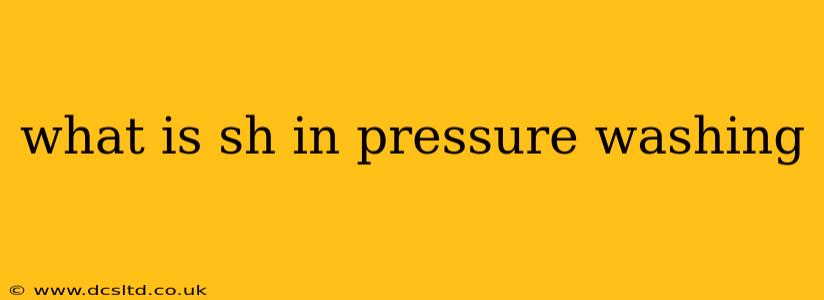When researching pressure washers, you'll inevitably encounter the terms PSI and GPM. Understanding these is crucial for choosing the right machine for your needs. But what about "SH"? While not as commonly used as PSI and GPM, SH (cleaning units) provides a valuable perspective on a pressure washer's cleaning power. Let's break it down:
What does PSI stand for in pressure washing?
PSI stands for pounds per square inch. This measures the water pressure the washer generates. A higher PSI means more powerful cleaning, ideal for removing stubborn dirt, grime, and even paint. However, excessively high PSI can damage surfaces, so it's important to choose a PSI appropriate for the task.
What does GPM stand for in pressure washing?
GPM stands for gallons per minute. This indicates the volume of water the pressure washer delivers per minute. A higher GPM means faster cleaning, covering more surface area quickly. However, a high GPM with low PSI might not be effective for heavy-duty cleaning.
What is SH (Cleaning Units) in pressure washing?
SH, or cleaning units, represents the combined cleaning power of both PSI and GPM. It's calculated by multiplying the PSI by the GPM. A higher SH value indicates a more powerful and efficient cleaning performance. This is a useful metric for comparing different pressure washers, considering both pressure and water flow. For example, a pressure washer with 2000 PSI and 2.0 GPM has an SH of 4000, while one with 1500 PSI and 3.0 GPM has an SH of 4500; the latter provides more cleaning power despite having a lower PSI.
How do PSI, GPM, and SH relate to each other?
The relationship between PSI, GPM, and SH is multiplicative:
SH = PSI x GPM
This means a pressure washer with a high PSI and a high GPM will naturally have a very high SH, resulting in excellent cleaning power. However, it's crucial to remember that the ideal balance of PSI and GPM will depend on the cleaning task.
What are the different types of pressure washers?
Pressure washers come in various types, each suited for specific tasks:
-
Electric Pressure Washers: These are lightweight, easy to use, and ideal for smaller cleaning jobs around the house. They typically have lower PSI and GPM than gas-powered models.
-
Gas Pressure Washers: Gas-powered pressure washers offer significantly higher PSI and GPM, making them suitable for heavy-duty cleaning tasks like cleaning driveways, decks, or vehicles. They are more powerful but also heavier and louder than electric models.
-
Hot Water Pressure Washers: These use heated water for enhanced cleaning power, ideal for removing grease, oil, and other stubborn substances. They are typically used in commercial settings.
What PSI and GPM do I need for different tasks?
The ideal PSI and GPM will vary depending on the surface and the level of dirt you need to remove.
- Light Cleaning (e.g., windows, siding): Lower PSI (1000-1500 PSI) and GPM (1.0-1.5 GPM) are generally sufficient.
- Medium Cleaning (e.g., decks, patios): A medium PSI (1500-2000 PSI) and GPM (1.5-2.0 GPM) will be more effective.
- Heavy-duty Cleaning (e.g., removing paint, cleaning concrete): High PSI (2000+ PSI) and GPM (2.0+ GPM) are needed for tough jobs.
Understanding the interplay between PSI, GPM, and SH is key to selecting the right pressure washer for your specific cleaning needs. Remember to always check the manufacturer's recommendations for safe and effective operation.
